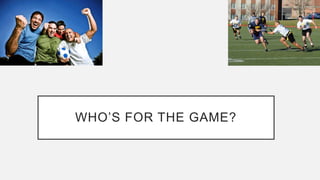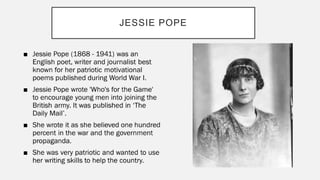Who's for the Game?
- 1. WHOâS FOR THE GAME?
- 2. JESSIE POPE
- 3. THE DAILY MAIL Remember: The Daily Mail was considered a low quality newspaper at the time. It also had a reputation for often being sensationalist (shocking people). Even today it is known for its support of the armed forces.
- 4. WHOâS FOR THE GAME? Who knows it wonât be a picnic â not much â Yet eagerly shoulders a gun? Who would much rather come back with a crutch Than lie low and be out of the fun? Come along, lads â But youâll come on all right â For thereâs only one course to pursue, Your country is up to her neck in a fight, And sheâs looking and calling for you. Jessie Pope Whoâs for the game, the biggest thatâs played, The red crashing game of a fight? Whoâll grip and tackle the job unafraid? And who thinks heâd rather sit tight? Whoâll toe the line for the signal to âGo!â? Whoâll give his country a hand? Who wants a turn to himself in the show? And who wants a seat in the stand?
- 5. WHOâS FOR THE GAME? WRITE YOUR ANSWERS DOWN IN SENTENCES. (10MIN) In pairs decide how this poem persuades people to join up: Do you think that it successfully achieves its purpose? How? Who is this poem targeting? What does the poem suggest about those who enlist to fight? What does it compare war to and how? Which techniques can you find? How do they create an impact for Popeâs audience? How would the British public have reacted? What about the soldiers fighting in the trenches?
- 6. 2 MINUTES â IN YOUR BOOKS: âĒ How would people react to this poem knowing it was written by a woman? âĒ How would soldiers react? âĒ Think about womenâs role before the war. âĒ If you can â think about the type of audience âThe Daily Mailâ had at the time.







